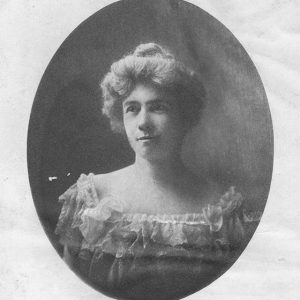calsfoundation@cals.org
Frances Marion Harrow Hanger (1856–1945)
Frances Marion Harrow Hanger was a clubwoman, civic volunteer, and writer who was central to the cultural and public life in Little Rock (Pulaski County) from the 1870s until the middle of the twentieth century.
Frances Marion Harrow was born on March 13, 1856, in Ottumwa, Iowa, to Francis M. Harrow and Harriet F. Humphreys Harrow. After she was orphaned at eight years old, she and her brother were raised by a collection of relatives, and both were afforded a fine formal education for the times. Harrow attended the women’s program at Iowa State University, the first coeducational university in the nation’s new land grant system. In 1877, she married Frederick Hanger, a prominent member of Little Rock’s farming and business communities, whom she had first met on a visit to family members in the city. The Hangers had three children, two of whom grew into adulthood—the first died of diphtheria at age three.
While Frances Hanger raised her children, she also found time to become deeply involved in the Little Rock community. She volunteered with countless clubs and organizations, serving as a founding member of the Arkansas History Commission and holding membership on the Mount Holly Cemetery Association Board. She also was an early member of the city’s Aesthetic Club, founded in 1883. Hanger served as the Aesthetic Club’s president in 1885–1886 while contributing in numerous subsequent other roles. Her work with this group brought her into contact with some of Little Rock’s other reform advocates, and she soon became active in the Daughters of the American Revolution (DAR), the Colonial Dames (where her efforts earned her the designation of Lifetime Honorary President National Society of Colonial Dames in America), and the Christ Church women’s auxiliary, as well as the Ingleside Book Club. She also served as the genealogist and historian of Pioneer Little Rock.
In many of these, she held formal executive offices, establishing herself as an active and effective leader. One organization in which she made a particular mark was the Arkansas chapter of the General Federation of Women’s Clubs (GFWC). The state chapter was established in 1897, and Hanger served as its president from 1899 to 1901, a period of major growth for the group, as well as one in which the club actively engaged in efforts in support of public libraries, the establishment of kindergartens and reform schools, and the development of domestic science programs in schools. The GFWC also lobbied successfully for the designation of the apple blossom as the Arkansas state flower.
In 1900, Hanger suddenly became a widow and was forced to address the challenges of single parenthood and self-support. Utilizing many of the skills she had developed in her volunteer efforts as well as her network of contacts, the onetime socialite became a journalist, contributing regularly to four newspapers in Little Rock, Memphis, and St. Louis from 1902 to 1917. Her writings—a distinctive combination of historical pieces, event reporting, and articles on women’s issues—circulated as far away as New York City. All of this expanded her already vibrant network, allowing her to be an influential voice in issues ranging from equal pay to women’s suffrage.
In 1912, she published the book From the Scrapbook of the Widow and the Bachelor, a collection of toasts and poems. In addition, Hanger was a frequent collaborator with many of the local male writers. In both her writing and her activism, Hanger exhibited the competing aspects of the women’s reform movements in Arkansas and the South. She was an ardent advocate of equal pay and wrote frequently about it. She also joined the voter rolls as soon as Arkansas allowed women to vote in primaries, and she remained a registered voter for the rest of her life. At the same time, however, she remained committed to maintaining the established racial lines as well as the distinctions of class that characterized the state and region at the time.
Hanger died on July 6, 1945, in Little Rock and is buried in Mount Holly Cemetery.
For additional information:
Blatti, Jo. “Frances Marion Hanger: Balancing the New Woman and the ‘Same Old Girl’ at the Turn of the Twentieth Century.” Arkansas Historical Quarterly 79 (Autumn 2020): 231–253.
“Frances Harrow Hanger (1856–1945).” Women’s Suffrage Centennial Project. Center for Arkansas History and Culture, University of Arkansas at Little Rock. https://ualrexhibits.org/suffrage/frances-harrow-hanger-1856-1945/ (accessed December 21, 2022).
“Frances Marion Harrow Hanger.” Find-a-Grave. https://www.findagrave.com/memorial/53907371/frances-marion-hanger (accessed December 21, 2022).
William H. Pruden III
Ravenscroft School
 Frances Hanger
Frances Hanger 



Comments
No comments on this entry yet.